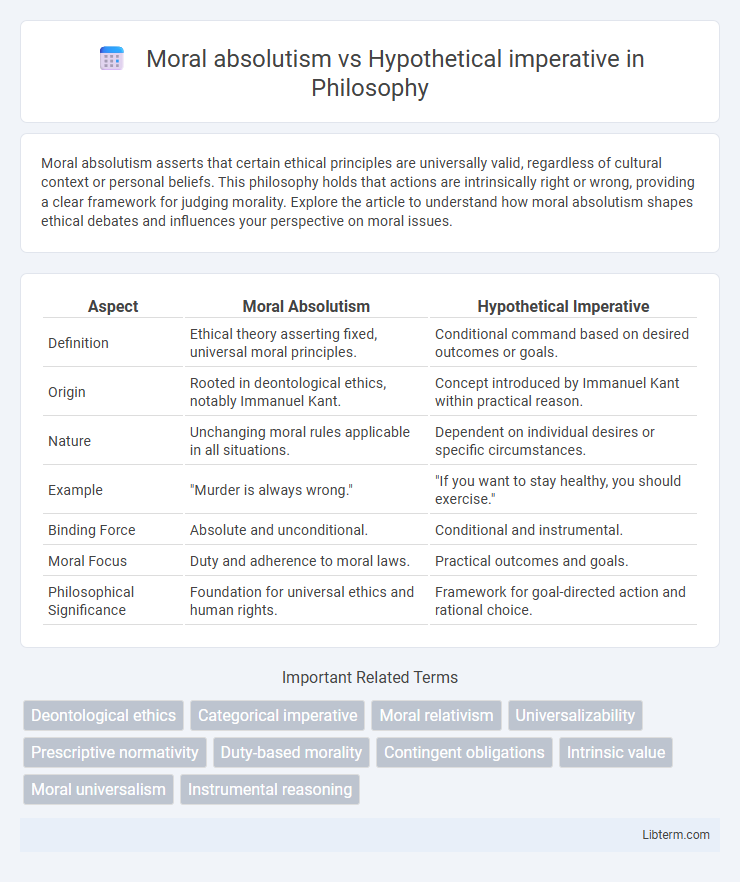Moral absolutism asserts that certain ethical principles are universally valid, regardless of cultural context or personal beliefs. This philosophy holds that actions are intrinsically right or wrong, providing a clear framework for judging morality. Explore the article to understand how moral absolutism shapes ethical debates and influences your perspective on moral issues.
Table of Comparison
| Aspect | Moral Absolutism | Hypothetical Imperative |
|---|---|---|
| Definition | Ethical theory asserting fixed, universal moral principles. | Conditional command based on desired outcomes or goals. |
| Origin | Rooted in deontological ethics, notably Immanuel Kant. | Concept introduced by Immanuel Kant within practical reason. |
| Nature | Unchanging moral rules applicable in all situations. | Dependent on individual desires or specific circumstances. |
| Example | "Murder is always wrong." | "If you want to stay healthy, you should exercise." |
| Binding Force | Absolute and unconditional. | Conditional and instrumental. |
| Moral Focus | Duty and adherence to moral laws. | Practical outcomes and goals. |
| Philosophical Significance | Foundation for universal ethics and human rights. | Framework for goal-directed action and rational choice. |
Introduction to Moral Absolutism and Hypothetical Imperatives
Moral absolutism asserts that certain ethical principles are universally valid, independent of context or consequences, emphasizing objective moral duties. Hypothetical imperatives, in contrast, prescribe actions based on desired outcomes, guiding behavior only if one has a specific goal. Understanding these concepts highlights the fundamental divide between unconditional moral rules and conditional practical reasoning in ethical theory.
Defining Moral Absolutism: Core Principles
Moral absolutism asserts that certain ethical principles are universally valid and unchanging, regardless of circumstances or consequences. It holds that specific actions are intrinsically right or wrong based on objective moral laws, not individual preferences or situational factors. This core principle contrasts sharply with the hypothetical imperative, which bases moral obligations on conditional, goal-oriented reasoning rather than absolute ethical mandates.
Understanding Hypothetical Imperatives in Ethical Theory
Hypothetical imperatives, central to Kantian ethics, prescribe actions based on desired outcomes, guiding decisions contingent upon individual goals rather than universal moral laws. Unlike moral absolutism, which asserts unwavering duties regardless of circumstances, hypothetical imperatives emphasize conditional actions that depend on specific purposes or situations. Understanding hypothetical imperatives reveals their role in practical reasoning, where obligations arise only if one aims to achieve particular ends within ethical decision-making frameworks.
Historical Roots: Kant and Moral Philosophy
Immanuel Kant's moral philosophy established the foundation of moral absolutism through his concept of the categorical imperative, which commands actions as universally binding regardless of personal desires or consequences. In contrast, the hypothetical imperative in Kantian ethics functions conditionally, guiding actions based on achieving specific goals or desires, reflecting a non-absolute, instrumental approach to morality. Kant's historical contributions distinguished these imperatives, emphasizing the morality of actions independently of outcomes, thereby shaping debates in moral philosophy about universality and conditionality in ethical decision-making.
Comparing Objective and Conditional Moral Laws
Moral absolutism asserts objective moral laws that apply universally, independent of circumstances, emphasizing duties that hold regardless of desires or outcomes. Hypothetical imperatives propose conditional moral directives based on individual goals or situations, prescribing actions only if certain conditions or intentions are present. The key difference lies in moral absolutism's unconditional standards versus the hypothetical imperative's reliance on specific purposes, highlighting a tension between universal ethics and context-dependent reasoning.
Real-world Examples of Absolutist Ethics
Moral absolutism asserts that certain ethical principles are universally valid, such as the prohibition of lying or killing, regardless of context or consequences. Real-world examples include the refusal of whistleblowers to withhold truth despite personal risk, reflecting an absolutist commitment to honesty. In contrast, the hypothetical imperative, as proposed by Kant, suggests that actions are conditional and goal-oriented, like exercising to stay healthy, highlighting the ethical distinction between unconditional moral laws and conditional practical commands.
Practical Applications of Hypothetical Imperatives
Hypothetical imperatives guide actions based on desired outcomes, making them crucial in decision-making frameworks like business strategy, where goals dictate specific operational steps. In practical applications, they enable adaptive problem-solving by prescribing actions only if particular conditions or objectives are met, such as following safety protocols to avoid accidents in manufacturing. This conditional nature contrasts with moral absolutism, which demands unconditional adherence to ethical rules regardless of situational variables.
Strengths and Weaknesses of Moral Absolutism
Moral absolutism offers the strength of providing clear, unchanging ethical guidelines that promote consistency and universal values across cultures and situations. However, its rigidity can be a significant weakness, as it fails to account for context or nuance, potentially leading to morally questionable outcomes in complex scenarios. The inflexibility of moral absolutism contrasts sharply with the conditional nature of the hypothetical imperative, which allows ethical decisions to adapt based on desired outcomes or specific circumstances.
Critiques and Limitations of Hypothetical Imperatives
Hypothetical imperatives face critiques for their conditional nature, relying on individual desires rather than universal moral principles, which limits their application across diverse ethical contexts. Critics argue that these imperatives cannot establish absolute moral duties because they depend on subjective ends, leading to inconsistent moral obligations. Furthermore, hypothetical imperatives fail to address conflicting desires, rendering them insufficient for resolving complex moral dilemmas.
Conclusion: Navigating Moral Decisions in Modern Society
Moral absolutism asserts that ethical principles are universal and unchanging, providing clear guidelines regardless of context, whereas hypothetical imperatives depend on specific goals and circumstances, offering flexibility in decision-making. Navigating moral decisions in modern society requires balancing these approaches to address complex ethical dilemmas effectively. Integrating absolute moral standards with situational considerations allows for reasoned judgments that respect both fundamental values and practical realities.
Moral absolutism Infographic

 libterm.com
libterm.com